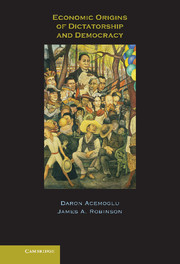Preface
Published online by Cambridge University Press: 05 September 2012
Summary
A fundamental question in political science and political economy is which factors determine the institutions of collective decision making (i.e., the “political institutions”). In tackling this question, a natural initial distinction is between democratic and nondemocratic institutions. Why is it that some countries are democracies, where there are regular and free elections and politicians are accountable to citizens, whereas other countries are not?
There are a number of salient empirical patterns and puzzles relevant to answering this question. For instance, while the United States moved very early toward universal white male suffrage, which was attained by the early 1820s by northern and western states and by the late 1840s for all states in the Union, such a pattern was not universal in the Americas. Elsewhere, republican institutions with regular elections were the norm after countries gained independence from colonial powers such as Spain and Portugal, but suffrage restrictions and electoral corruption were much more important. The first Latin American countries to implement effective, relatively noncorrupt universal male suffrage were Argentina and Uruguay in 1912 and 1919, respectively, but others, such as El Salvador and Paraguay, did not do so until the 1990s – almost a century and a half after the United States.
Not only is there great variation in the timing of democratization, there also are significant qualitative differences in the form that political development took.
- Type
- Chapter
- Information
- Economic Origins of Dictatorship and Democracy , pp. xi - xviPublisher: Cambridge University PressPrint publication year: 2005
- 1
- Cited by



